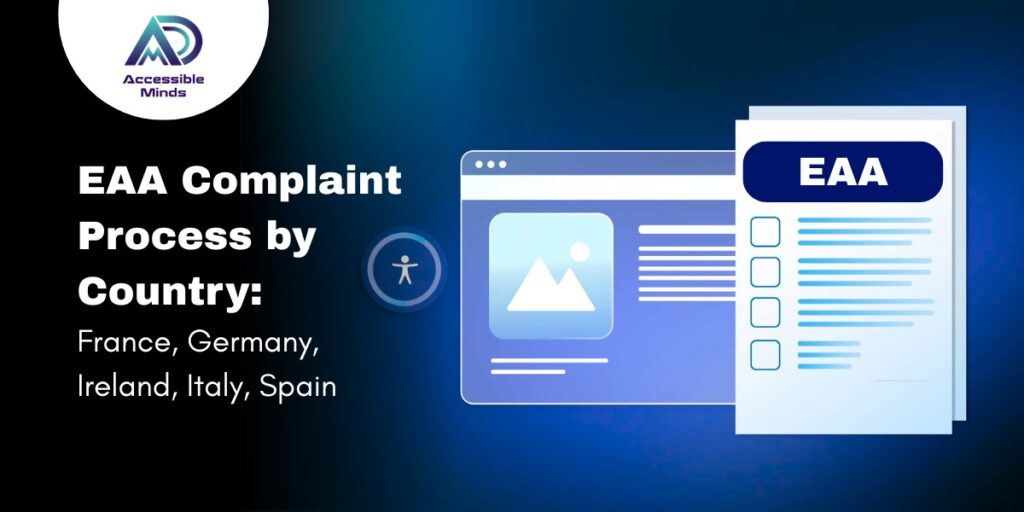The European Accessibility Act (EAA) is transforming the digital landscape in the EU. By enforcing accessibility standards across industries, the EAA ensures that people with disabilities can access essential digital products and services—ranging from websites and mobile apps to banking systems, e-commerce platforms, and e-books. But what happens when an organization fails to meet these standards?
In 2025, with full EAA enforcement underway, understanding the complaint processes across EU member states is critical for both consumers and businesses. In this blog, we’ll explore how the EAA complaint mechanisms work in France, Germany, Ireland, Italy, and Spain, and why investing in Web Accessibility services is no longer optional—it’s a legal and ethical necessity.
1. France: Defender of Rights and Digital Accessibility
In France, the defender of digital rights is the Défenseur des Droits, an independent constitutional authority that handles accessibility complaints.
Complaint Process:
- Individuals can file a complaint online via the Défenseur des Droits website or by mail.
- Complaints can be related to inaccessible websites, mobile apps, or digital services of public or private sector entities.
- If the issue falls within the EAA’s scope, the Défenseur can investigate, mediate, or escalate to court proceedings.
Why It Matters:
French law aligns closely with the EAA and WCAG guidelines. Organizations operating in France must integrate Web Accessibility services into their compliance programs to avoid legal disputes and reputational harm.
2. Germany: Federal Accessibility Monitoring
Germany has a robust legal structure for accessibility through the Federal Act on Equal Opportunities for Persons with Disabilities (BGG) and the Barrierefreie-Informationstechnik-Verordnung (BITV 2.0).
Complaint Process:
- Complaints are filed with the Federal Monitoring Agency for Accessibility of Information Technology (Überwachungsstelle des Bundes für Barrierefreiheit von Informationstechnik).
- The agency conducts accessibility audits, accepts citizen complaints, and enforces corrective action.
- Formal administrative steps follow, potentially leading to fines or mandatory remediation.
Why It Matters:
Germany enforces compliance systematically. Private companies and public agencies alike must invest in continuous accessibility evaluation, making Web Accessibility services a foundational part of digital operations.
3. Ireland: National Disability Authority (NDA)
Ireland has streamlined its accessibility oversight under the Disability Act 2005 and aligns with EAA standards via the National Disability Authority (NDA) and the Centre for Excellence in Universal Design (CEUD).
Complaint Process:
- Individuals can lodge complaints about inaccessible digital services with the organization first.
- If unresolved, complaints are escalated to the Office of the Ombudsman or the NDA, depending on the body involved.
- The NDA also provides accessibility guidance, training, and audits.
Why It Matters:
Ireland emphasizes proactive compliance through education and design support. However, public sector bodies and EU service providers must still meet EAA obligations, underscoring the importance of third-party Web Accessibility services for audits and remediation.
4. Italy: Agency for Digital Italy (AgID)
Italy enforces digital accessibility through the Legge Stanca and the Digital Administration Code, now harmonized with EAA standards. The Agency for Digital Italy (AgID) oversees enforcement.
Complaint Process:
- Users report accessibility violations to the AgID via a structured complaint form available on their official portal.
- AgID may initiate inspections or request corrective measures.
- Non-compliance can lead to administrative penalties, especially for government websites and large service providers.
Why It Matters:
Italy’s growing emphasis on accessible digital governance makes Web Accessibility services vital for organizations aiming to serve the Italian market—especially for those in fintech, e-commerce, and education sectors.
5. Spain: Royal Decree & Complaint Oversight
Spain enforces accessibility under Royal Decree 1112/2018, which implements Directive (EU) 2016/2102 and aligns with the EAA. Oversight lies with the Ministry of Economic Affairs and Digital Transformation.
Complaint Process:
- Users can submit complaints or suggestions via the Accessibility Statement page on the relevant website.
- If no resolution is provided within 20 days, complaints can escalate to the Council of Transparency and Good Governance.
- Affected users can seek redress through the legal system if necessary.
Why It Matters:
Spain mandates that digital accessibility be embedded into both public and private digital services. Web Accessibility services help organizations meet technical WCAG compliance while preparing for formal inspections and public reporting.
The Bigger Picture: Avoiding Complaints Through Compliance
While the complaint mechanisms vary slightly from country to country, the underlying requirements are clear and consistent: Digital services must be accessible to all users, regardless of ability.
For businesses across the EU—or those serving EU customers—ensuring compliance with the EAA isn’t just about avoiding complaints. It’s about:
- Protecting brand reputation in an increasingly inclusive market.
- Reducing legal risk through proactive accessibility audits and fixes.
- Improving UX for all users, including those with visual, auditory, motor, and cognitive impairments.
This is where Web Accessibility services play a critical role. These specialized services help organizations navigate regional legislation, implement WCAG-compliant design, and stay ahead of enforcement deadlines.
Conclusion: Compliance Starts with Action
As the European Accessibility Act reshapes the digital economy, understanding how accessibility complaints are handled in countries like France, Germany, Ireland, Italy, and Spain is essential. Rather than waiting for users to file complaints, forward-thinking organizations are partnering with Web Accessibility services providers to audit, remediate, and future-proof their platforms.
Compliance isn’t just a legal obligation—it’s a commitment to digital equity. And in 2025, it’s more important than ever.

